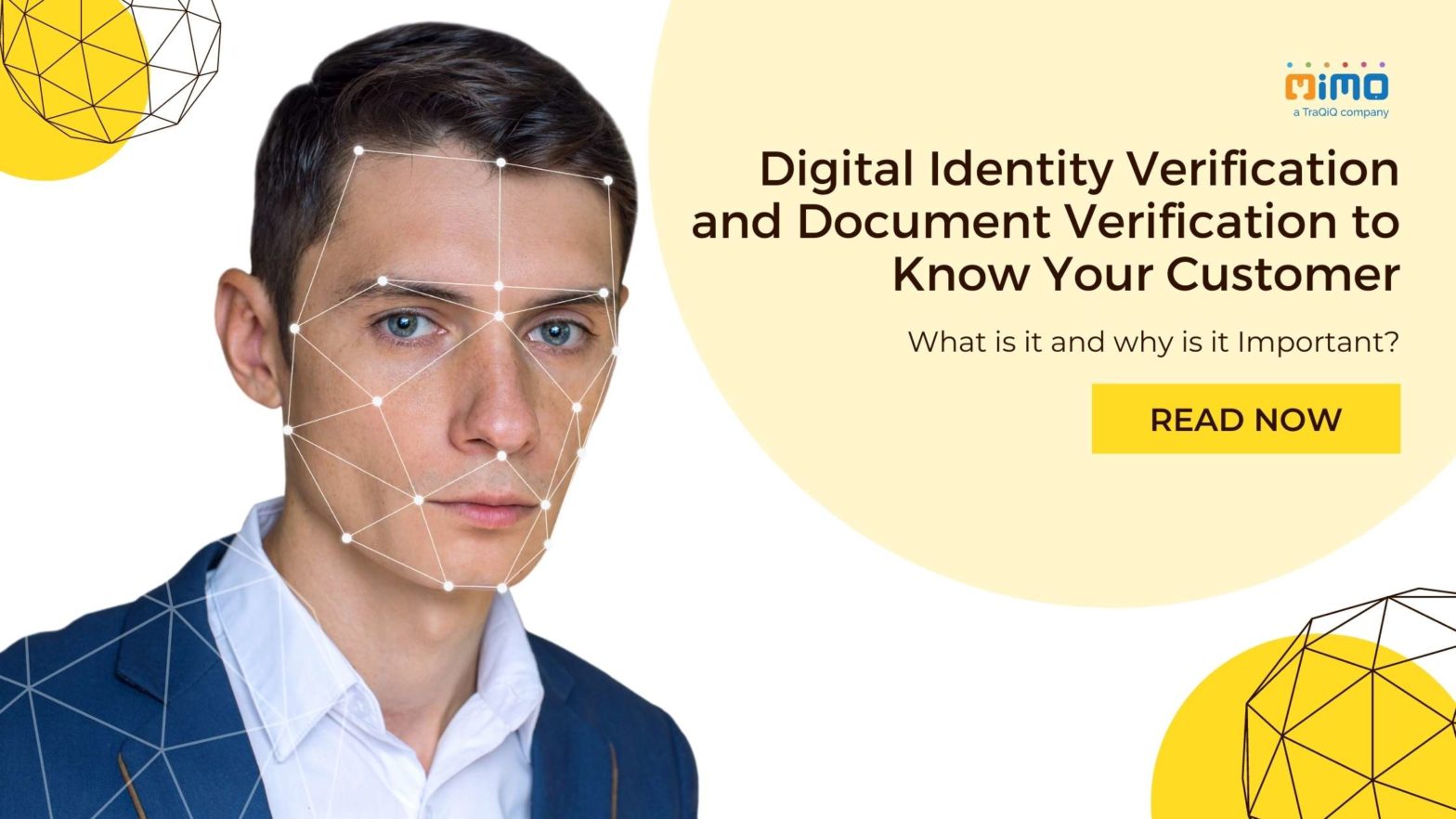
Digital Identity Verification and Document Verification to Know Your Customer
Document verification is important when onboarding new customers, depending on the type of bank you are running. KYC checks are now the norm in every industry, online and offline, no matter your business. Every business wants a long-lasting relationship with its clients, and every relationship begins with trust.
Document verification is the first step to creating that trust. Verification is crucial for businesses to guarantee that legitimate client accounts aren’t compromised and that they aren’t placing themselves at risk of fraudulent transactions. Customers also need to have equal trust in the company or bank. The initial stage in developing this trust is digital identity verification. Customers are more likely to return for additional purchases if they believe the procedure is fast, accurate, and secure. Additionally, businesses may concentrate on other tasks, like offering the most excellent experience possible, if they are convinced that clients are who they claim to be.
Table of Contents
Why is Digital Verification important?
Customers may lose control of their accounts if the documentation is submitted without notice and have money spent without their knowledge if their credentials are stolen. As victims learn the full depth of the problem, the effects of ID compromise can endure for months or even years. For instance, there are cases where victims receive calls from creditors from banks stating that they owe money and will have to face strict legal action. Deplorable document verification systems can help lower this risk by streamlining businesses to identify and thwart fraud before it gets out of control
Meanwhile, fraud and identity theft can cost businesses money because consumers may switch to more secure rivals or find the company’s inadequate data protection. Some of the reasons why electronic identity verification matters include:
Help to Prevent Fraud
Digital identity verification reduces discount abuse and increases the ROI of customized offers. Discount fraud is observed by businesses using identity marketing initiatives more than before.
Numerous businesses that provide students with personalized offers often compromise email addresses to confirm eligibility, which is quite a serious act. After a few years, many of the graduates still carry these email addresses. Utilizing faulty email address verification also restricts your audience because more than 40% of college students never received the wrong email address. Creating false email addresses is also simple, and many businesses lose money to fraudsters who do that. But digital validation is effective.
Help to carry out long-term relationships
Thanks to digital verification, customers are more likely to return when a procedure is quick, trustworthy, and secure. Contrarily, ID procedures that take too long are erroneous; keeping users in the dark about their status in the procedure or what will happen next will thwart efforts to forge reciprocal connections.
Respect Customer Privacy

Customers are concerned about the security of their personal information, and cases are growing in huge amounts. 4 out of 5 customers prefer not to do business with a company that doesn’t follow the right verification method and has faulty privacy practices. By requesting only the most basic personal information, digital verification protects their privacy. More than two-thirds of consumers are willing to share their name, birthdate, email address, and physical and mailing addresses for a personalized offer.
Privacy must be respected when implementing an identity marketing program that targets college students.
Helps in Boosting Operational Efficiency
Through automation, reliable digital identity verification tools help to increase overall productivity. The correct tools can decrease the need for manual review of PII and boost overall decision-making speed without compromising security by utilizing complex data analysis and comparison algorithms.
Increase the Confidence of Consumers
Customers are frequently eager to give businesses access to their personal and financial information to ease friction and speed up transactions. To avoid having to enter their credit card information each time they wish to make a purchase, users can, for instance, allow a website to remember it. Customers who find it comfortable can feel more at ease with the process thanks to secure and open digital verification services that reduce the overall time and energy spent reviewing documents and details manually.
Different Types of Digital Identity Verification :
Knowledge-Based Authentication
Knowledge-based authentication (KBA), which asks for an answer to security questions, confirms a person’s identification and general information sent. These questions are generally made straight for the person answering them but challenging for everyone else. Like “Who was your favorite teacher?” or “Which pets do you love?” A further precaution for KBA is the necessity to respond to the questions at a specific time. The fact that KBA is the most user-friendly verification method has the most advantage. However, the drawback of this method is how simple it is to find solutions through social networking

Two-Factor Authentication
In this type, the customer enters a code given to their email or mobile phone as part of two-factor or multi-factor authentication. Today, many online services use the verification technique; consumers may easily recognize and comprehend how to utilize it. You may quickly confirm a customer’s email address and phone number with 2FA or MFA. The process is critical; you need to be sure your consumer did not enter their info improperly.
Users need to provide their identification, commonly referred to as a token, along with the regular username and password when using the two-factor authentication.
Credit Bureau-Based Authentication
In the credit Bureau- based authentication, data from one or more of the credit bureaus are collected. The data involves name, address, and social security numbers. These are an important part of customer verification.
Credit-based authentication establishes a certain match of customers without jeopardizing the data for business benefit. However, for young people and new immigrants with thin credit files, it might not match.
Database Methods
Database ID techniques help check an individual’s identity card using information from many sources. Since the method helps assess the overall risk for the user, there is no need for manual reviews. Due to the prevalence of fictitious online identities, this method’s biggest drawback is that it doesn’t guarantee that the person supplying the information is also the one carrying out the transaction.
Online Verification
Artificial intelligence, machine learning, and human assessment are a few methods used in online verification to establish whether a government-issued ID belongs to the users. This verification technique often asks users to upload a photo of themselves holding an ID to confirm that the person on the ID is the same. Online verification is highly secured and is now followed by every other website. Still, some users find having to provide a photo of their face and ID to be a hassle or an invasion of privacy.
Biometric Verification
Based on bodily traits, biometrics helps in identifying and authenticating people. Facial recognition, iris, voice recognition, retina scanning, and fingerprinting are all examples of biometric technology. Customers who use these techniques will find them quite convenient because there are no passwords to remember or questions to respond to.
Using the Best Digital Identity Verification Service
It is best to connect with professionals to make the best use of electronic verification identification through modern tools. MIMOIQ is the leading company that deals with background checks and identity verification for NDFC, banks, and e-commerce companies. With the nationwide coverage, the company uses professional and agile technology, including geo-tagging, online data verification, and others
Like this article?
More To Explore

What Factors Should Organizations Consider Before Outsourcing Their Internal Audit Functions?
+91 1141182211 Outsourcing has become a strategic choice for many organizations looking to streamline operations, reduce costs, and enhance efficiency.

Outsourcing Internal Audit: Evaluating the Upsides and Downsides for Your Organization
+91 1141182211 In today’s dynamic business environment, companies face increasing pressure to enhance efficiency, manage risks effectively, and ensure compliance

A Background Verification Guide: Frequently Asked Questions and Their Answers
+91 1141182211 Background verification (BGV) is a crucial process used by employers to ensure they are hiring candidates with accurate

